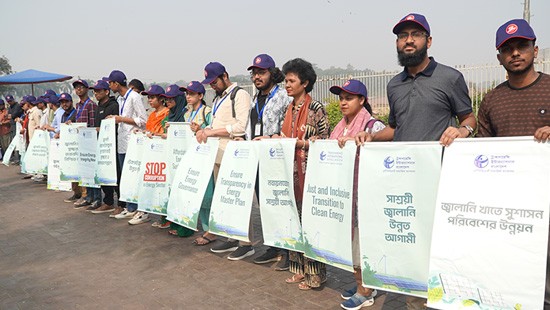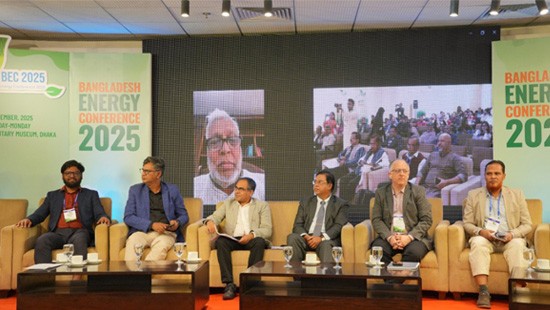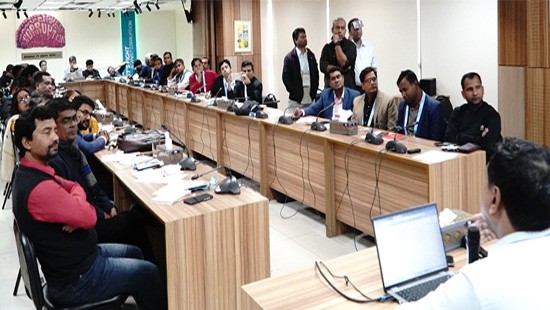Published: 13 May 2022

Dhaka, 11 May 2022: Bangladesh's electricity production capacity and energy regulation have seen unprecedented progress in the last decade, but governance challenges in the sector are still persistent. Notably, the energy policy is essentially 'captured’ by foreign donors, investors, and companies as the country is highly dependent on foreign planning and project expertise, said Transparency International Bangladesh (TIB) in a virtual release of the research report titled 'Coal and LNG-based Power Projects in Bangladesh: Governance Challenges and Way Out'. TIB's research has also stated that there has not been much progress in renewable energy sources despite national and international commitments.
TIB conducted qualitative research by analysing three power plants: the Barisal coal power plant, Banshkhali SS power plant, and Matarbari LNG power plant. The focus of the study was to analyse policy mechanisms and governance challenges related to the planning, approval, and implementation of the power plant.
The study findings unearth that the energy development sector relies on donor-based policy and planning. It says that local and foreign investors in the sector have captured policy mechanisms by taking the chance of legal loopholes that allow investors to get higher profits by importing surplus coal technology into Bangladesh. Even if they are not necessary, the authorities approve coal and LNG-based power plants as vested quarters can carry out illicit dealings and earn quickly from such projects.
By analysing energy policy structures, researchers at TIB revealed that the government could not prepare the Power System Master Plan (PSMP) on its own. Instead, they depended on the donor organisation JICA to prepare it. The donor organisation hired Tokyo Electric Power Company (TEPCo) as a consultant for the task, demonstrating a conflict of interest. As a result, the PSMP was designed to expand Japanese businesses, which preferred coal and LNG-based power plants for protecting monetary interests. On the other hand, local experts were not included in the PSMP preparation process.
The quick rental electricity projects adopted under the Quick Enhancement of Electricity and Energy Supply (Special Provisions) Act 2010 were not implemented in a planned way, making way for more irregularities, said the TIB study. In addition, energy projects are being implemented in ecologically critical areas as legal loopholes in the Environment Conservation Act, 1995 allow companies to sidestep regulations. These supercritical and ultra-supercritical coal power projects are also deemed massive carbon emitters.

Speaking to the press during the research release, TIB Executive Director Dr. Iftekharuzzaman said, “Overdependence on donors and investors has led to policy capture in the sector, which is alarming. The abuse of power and corruption by influential quarters to maximise profits of power producers and investors is also evident. The investors in the sector are getting unethical advantages as competitive methods are not followed in producing and buying electricity due to special provisions. In many cases, the power projects are planned and implemented without considering environmental and social factors.”
Mentioning that environmental protection activists have even faced human rights violations while protesting such projects, Dr. Zaman said, “Despite the cancellation of 10 coal power projects, the number of coal and LNG-based power plants planned to be implemented by 2030 is a matter of concern. The Constitution of Bangladesh (Article 18A) states that the environment and biodiversity must be protected. And as per international mandates and SDGs, Bangladesh is supposed to move toward renewable energy sources. In contrast, we are going in the opposite direction with coal and LNG-based power projects. As donor organisations and investors are designing the energy master plan, the conflict of interest creates a dangerous situation.”
The TIB ED emphasised attracting more investments in the renewable energy sector as global prices of the technology have significantly reduced, and Bangladesh must take the opportunity to adopt such technologies. The research also gave seven recommendations, including the removal of quarters with conflicts of interest from the energy policy and the formation of a specific roadmap to adopt renewable energy projects.
For details of the research release, visit - Coal and LNG-based Power Projects in Bangladesh: Governance Challenges and Way Out






